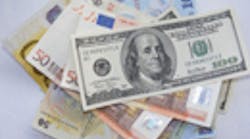The gathering debt crisis in Europe not only threatens the very existence of the Euro as a common currency among many European Union member nations, it is likely to lead Europe into a recession—if it has not already entered one—and along the way create a global credit crunch that in turn would greatly impact U.S. exports and possibly push this country into recession.
According to a news report posted by The New York Times, German Chancellor Angela Merkel “warned reluctant members of her conservative party in no uncertain terms on Monday that deeper political integration was necessary if Europe’s common currency was to be saved.”
Merkel told her party that “not less Europe but more” was the answer to the sovereign debt crisis assaulting the Eurozone. Merkel, noted The Times, “drove home her point with unusual oratorical urgency, saying Europe had likely entered ‘the most difficult hours since World War II…It is now the task of our generation to complete the economic and currency union in Europe and create, step by step, a political union.’”
But the changes needed to make that happen could take years - requiring approval by all 27 nations of the European Union. In any event, creating a true political union for Europe cannot do anything about solving the immediate crisis hitting the heavily indebted PIIGS (Portugal, Italy, Ireland Greece and Spain) nations and the continent’s undercapitalized banks.
The report by The Times also noted that the “push for deeper cooperation within the Eurozone also awakens fears among the 10 members of the European Union that do not use the Euro that Europe will break into two blocs — usually referred to as two-speed Europe — divided by different rules for those in the currency union and those outside of it.”
Economic expansion in Germany and France “helped to keep the European economy growing in the third quarter, official data showed Tuesday, even as the Euro makes it increasingly probable that the good times will soon come to an end,” The Times report pointed out. “Third-quarter real gross domestic product grew 0.2% from the previous three months in both the 17 Eurozone nations and in the 27 nations that make up the European Union… By way of contrast, the U.S. economy grew by 0.6% in the third quarter from the second, while the Japanese economy grew by 1.5%.”
Indeed, Olli Rehn, the European commissioner for economic and monetary affairs, said last week that Europe’s economic recovery “has now come to a standstill, and there is a risk of a new recession.”
And as Europe goes, so may go the U.S., if not the world. “There are so many pundits who have made predictions about the impact of the Euro crisis with the outcomes ranging up to global recession,” Kenny Vieth, president and senior analyst of ACT Research Co., told Fleet Owner. “How the situation over there actually plays out will be critical to what will result here and in other markets.
“One direct impact will be on U.S. exports,” he continued. “One-fifth goes to Europe, so if Europe falls into recession [as a result of the Euro crisis], especially a deep one, U.S. exports would be exposed to some downturn. And that would result in a slowdown of U.S. economic growth.” Vieth also stated that if the Eurozone falls apart, “global credit markets would be impacted as they were in 2008 when Lehman Brothers went down.”
(Continue reading "Will Eurogeddon get us, too?")
However, he is optimistic to some degree about what may happen with the Euro. “I would like to think the worst outcome [the dissolution of the Eurozone] is unlikely. As we are following the events in Europe, they are happening literally in slow motion - unlike the dramatic failure of Lehman Brothers. We’re older and wiser now and have been waiting for Europe to fall for 18 months and it could be another six months before it happens. This time around, the world is better prepared due to the ‘lead time’ to withstand the eventual fallout.”
According to Vieth, the key question is whether the Europeans—led by Germany and France—have the political will to make the monetary union still work. “Germany may have to let the central bank print more money, devaluing the Euro, to get out of this. So far, Germany has been lending to other nations to keep them afloat, but has not been willing to print more money.
“In effect,” he continues, “Europe has been doing just enough to forestall the monetary crisis for 18 months—constantly kicking the can down the street, as it were. They’ve been putting the fire out short term, so there’s no need to expect the Eurozone to explode. But at some point, just enough will no longer be enough and Europe will have to make hard decisions.”
Vieth said the main options then would be a European-wide devaluation of the Euro or allowing Greece out of the European Monetary Union so it can devalue its own currency. “There is also the risk of contagion—if Greece doesn’t pay, would other weaker nations default, too? This remains an issue with lots more questions than answers at this point.”
Analyst Chris Brady, president of Commercial Motor Vehicle Consulting, told Fleet Owner that the U.S. is “probably already seeing the impact now of a slowdown in exports to Europe; they are still growing but that growth is moderating. And that is a sign Europe will probably enter a recession.”
Brady said the PIIGS (Portugal, Ireland, Italy, Greece, Spain) nations with debt problems having been putting stress on the rest of the Eurozone for the last 18 months. “The restrictive policies the Europeans are adopting in reaction to the crisis are dragging on growth in Europe, especially in Italy. Now France too is feeling stress, so they will have to enact restrictive policies.
“These restrictive policies that hamper growth will push Europe into recession—if it is not already in one,” he continues. “And a European recession will hurt our exports there. That doesn’t mean we will automatically go into recession—but we do not have a cushion against that growing at our current economic rate. So, there is an increased risk of the U.S. falling into recession after Europe does.”




